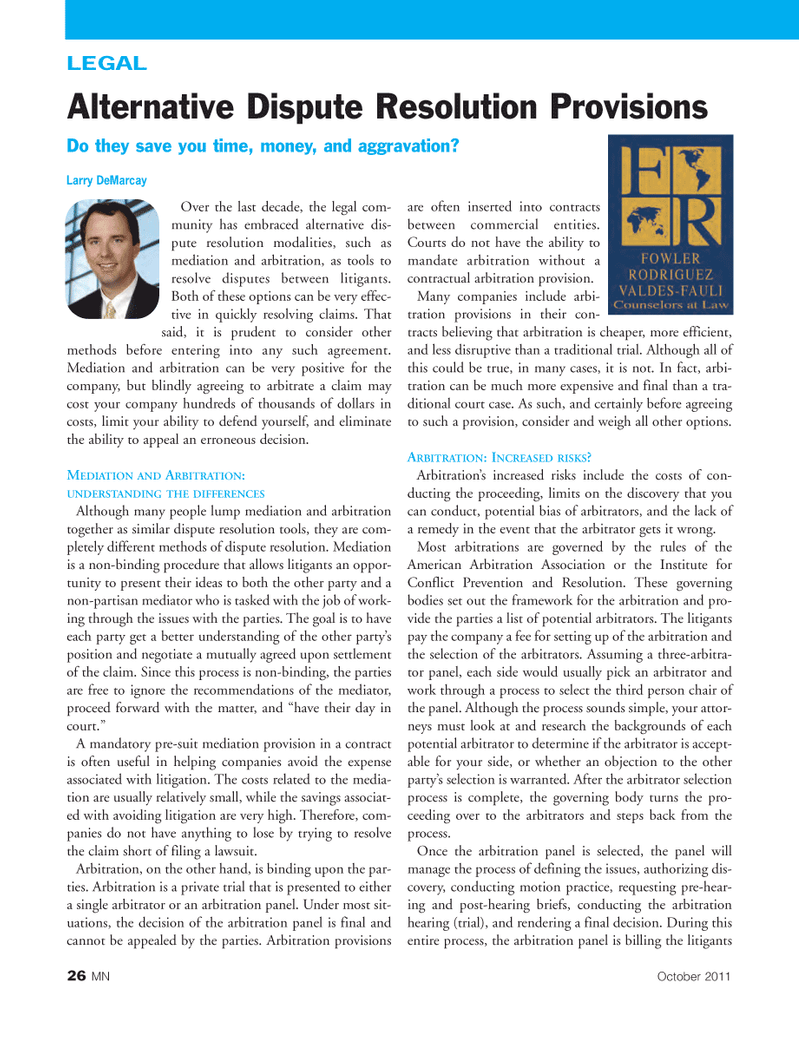
Page 26: of Marine News Magazine (October 2011)
The Yearbook
Read this page in Pdf, Flash or Html5 edition of October 2011 Marine News Magazine
26MNOctober 2011LEGALOver the last decade, the legal com- munity has embraced alternative dis- pute resolution modalities, such as mediation and arbitration, as tools toresolve disputes between litigants. Both of these options can be very effec- tive in quickly resolving claims. That said, it is prudent to consider other methods before entering into any such agreement. Mediation and arbitration can be very positive for the company, but blindly agreeing to arbitrate a claim may cost your company hundreds of thousands of dollars in costs, limit your ability to defend yourself, and eliminate the ability to appeal an erroneous decision. MEDIATIONAND ARBITRATION : UNDERSTANDINGTHEDIFFERENCES Although many people lump mediation and arbitrationtogether as similar dispute resolution tools, they are com- pletely different methods of dispute resolution. Mediation is a non-binding procedure that allows litigants an oppor- tunity to present their ideas to both the other party and a non-partisan mediator who is tasked with the job of work- ing through the issues with the parties. The goal is to have each party get a better understanding of the other party?s position and negotiate a mutually agreed upon settlement of the claim. Since this process is non-binding, the parties are free to ignore the recommendations of the mediator, proceed forward with the matter, and ?have their day in court.? A mandatory pre-suit mediation provision in a contract is often useful in helping companies avoid the expense associated with litigation. The costs related to the media- tion are usually relatively small, while the savings associat- ed with avoiding litigation are very high. Therefore, com- panies do not have anything to lose by trying to resolve the claim short of filing a lawsuit. Arbitration, on the other hand, is binding upon the par-ties. Arbitration is a private trial that is presented to either a single arbitrator or an arbitration panel. Under most sit- uations, the decision of the arbitration panel is final andcannot be appealed by the parties. Arbitration provisions are often inserted into contracts between commercial entities. Courts do not have the ability to mandate arbitration without acontractual arbitration provision. Many companies include arbi- tration provisions in their con- tracts believing that arbitration is cheaper, more efficient, and less disruptive than a traditional trial. Although all of this could be true, in many cases, it is not. In fact, arbi- tration can be much more expensive and final than a tra- ditional court case. As such, and certainly before agreeing to such a provision, consider and weigh all other options. ARBITRATION : INCREASEDRISKS ?Arbitration?s increased risks include the costs of con- ducting the proceeding, limits on the discovery that you can conduct, potential bias of arbitrators, and the lack ofa remedy in the event that the arbitrator gets it wrong. Most arbitrations are governed by the rules of the American Arbitration Association or the Institute for Conflict Prevention and Resolution. These governing bodies set out the framework for the arbitration and pro- vide the parties a list of potential arbitrators. The litigants pay the company a fee for setting up of the arbitration andthe selection of the arbitrators. Assuming a three-arbitra- tor panel, each side would usually pick an arbitrator andwork through a process to select the third person chair of the panel. Although the process sounds simple, your attor- neys must look at and research the backgrounds of each potential arbitrator to determine if the arbitrator is accept-able for your side, or whether an objection to the other party?s selection is warranted. After the arbitrator selection process is complete, the governing body turns the pro- ceeding over to the arbitrators and steps back from the process. Once the arbitration panel is selected, the panel will manage the process of defining the issues, authorizing dis- covery, conducting motion practice, requesting pre-hear- ing and post-hearing briefs, conducting the arbitrationhearing (trial), and rendering a final decision. During this entire process, the arbitration panel is billing the litigants Alternative Dispute Resolution Provisions Larry DeMarcay Do they save you time, money, and aggravation? MN#10 (18-31):MN 2011 Layouts 10/5/2011 1:52 PM Page 26

 25
25

 27
27
